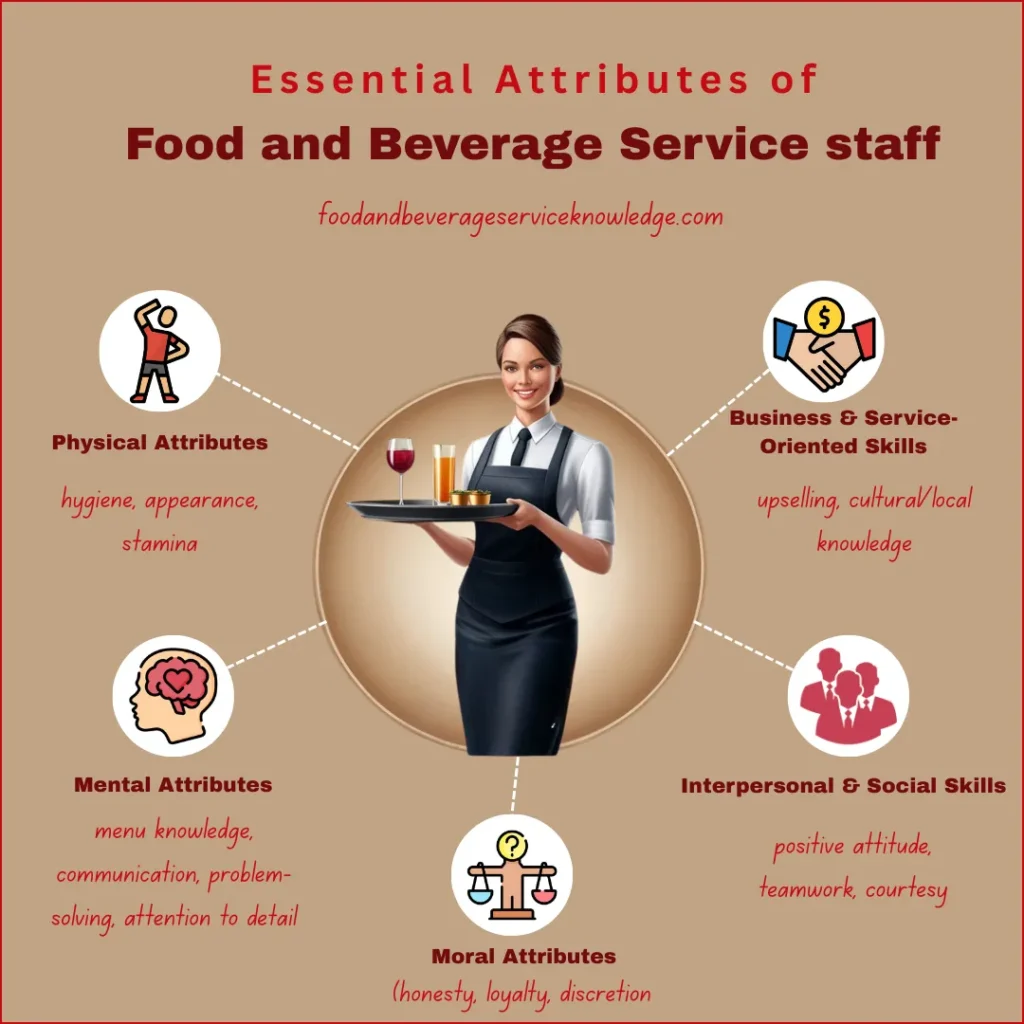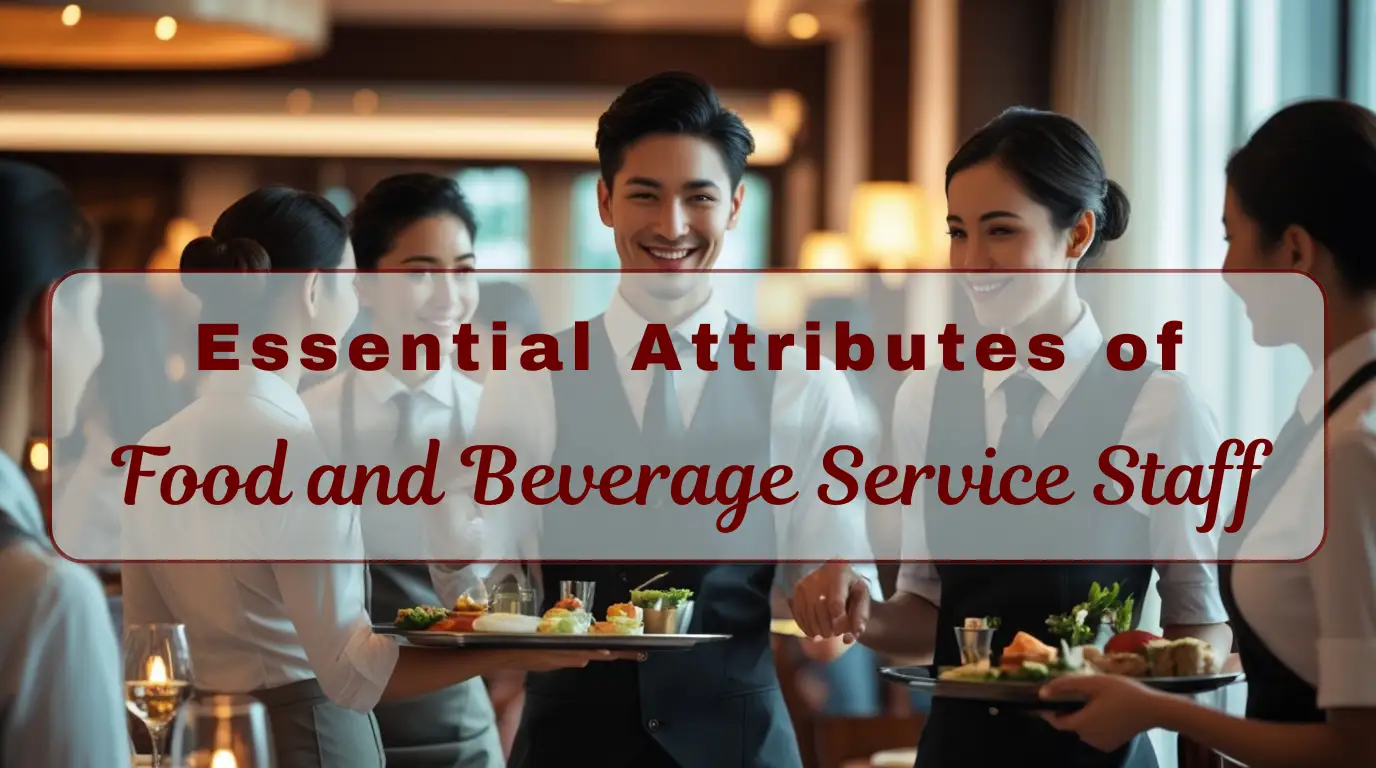The food and beverage (F&B) industry is a dynamic and highly competitive sector where customer satisfaction is the top priority. At the heart of every unforgettable dining experience is the service staff, whose professionalism and attitude play a pivotal role in creating a welcoming, polished, and enjoyable atmosphere. Whether it’s in an elegant fine-dining restaurant, a casual café, a busy hotel, or a grand banquet setting, the attributes of food and beverage service staff often determine whether guests become loyal patrons or leave with disappointment.
In this in-depth guide, we will cover the essential attributes of F&B service staff. It’s aimed at hospitality professionals, trainers, managers, and anyone eager to raise service standards and deliver exceptional guest experiences.
What Are the Attributes of Food and Beverage Service Staff?
In short, the key attributes of food and beverage (F&B) service staff are:
- Impeccable personal hygiene
- Professional, well-groomed appearance
- Strong product and menu knowledge
- Effective communication and active listening
- Calm, quick problem-solving abilities
- Honesty and integrity
- Positive attitude and enthusiasm
- Team spirit and collaboration
- Tact, courtesy, and cultural sensitivity
- Subtle salesmanship and upselling skills
These qualities form the foundation of great service, ensuring guests leave happy and businesses thrive.
Before diving into the full guide, here’s a visual summary of the essential attributes every food and beverage service staff member should master.

1. Physical Attributes
- Impeccable Personal Hygiene: Hygiene is non-negotiable in F&B. Staff handle food and interact closely with guests. Clean hands, neat hair, and fresh breath show respect for guests and ensure safety.
- Professional Appearance: First impressions count. Pressed uniforms, polished shoes, and neat grooming build trust and reinforce the brand image, leaving guests confident in the establishment.
- Physical Stamina and Endurance: Long hours on your feet and fast-paced work demand stamina. Maintaining personal health and pacing during peak hours ensures consistent, high-quality service.
2. Mental Attributes
- Strong Product Knowledge: Staff must deeply understand the menu to recommend confidently, handle dietary questions, and enhance the dining experience through informed suggestions.
- Effective Communication: Clear speaking, active listening, and reading guest cues are essential. Good communication ensures smooth service and prevents misunderstandings.
- Problem-Solving Skills: Challenges arise daily. Staying calm and finding quick, fair solutions—like offering small compensations—turns problems into opportunities for guest satisfaction.
- Attention to Detail: Noticing small needs, perfecting table setups, or remembering regular guests’ preferences shows care and elevates the overall experience.
Also Read: Waiter/Waitress Job Description: Duties, Responsibilities, and Essential Skills
3. Moral Attributes
- Honesty and Integrity: Guests trust staff to act honestly, whether handling payments or fixing mistakes. Integrity builds long-term loyalty and strengthens team culture.
- Loyalty to the Establishment: Loyal staff go beyond their duties, supporting the brand and colleagues. Loyalty thrives in fair, supportive workplaces with growth opportunities.
- Discretion and Confidentiality: Staff often encounter private matters. Respecting guest privacy and avoiding gossip fosters trust and a safe environment.
4. Interpersonal and Social Skills
- Positive Attitude and Enthusiasm: An upbeat attitude uplifts the team and creates a welcoming atmosphere. Positivity under pressure improves morale and guest satisfaction.
- Teamwork and Collaboration: Hospitality relies on teamwork. Effective collaboration keeps service smooth, especially during busy periods, ensuring guests are the priority.
- Tact and Courtesy: Handling guests politely and sensitively, especially in delicate situations, can turn potential issues into positive moments.
- Sense of Urgency and Efficiency: Fast, organised service is key. Staff must anticipate needs and stay efficient without compromising quality or guest care.
5. Business and Service-Oriented Attributes
- Salesmanship and Upselling Skills: Smart upselling enhances guest experience and boosts revenue. Recommending specials or pairings naturally adds value without being pushy.
- Local and Cultural Knowledge: Guests often seek local tips. Staff with cultural and local knowledge provide added value, enriching the overall guest visit.
How to Develop and Sustain These Attributes
While some people are naturally inclined to excel in service, most attributes can be nurtured through proper training, experience, and workplace support. Here are some key strategies:
- Regular Training: Offering workshops on communication, upselling, cultural sensitivity, and conflict resolution keeps skills sharp.
- Mentorship Programs: Pairing new hires with experienced mentors helps accelerate learning and fosters confidence.
- Constructive Feedback: Providing regular, constructive feedback allows staff to identify strengths and areas for improvement.
- Employee Wellness: Supporting staff with adequate breaks, fair scheduling, and wellness initiatives promotes physical and mental health, which directly impacts service quality.
Leaders and managers play a crucial role in modelling these attributes, setting clear expectations, and creating an environment where staff feel valued and motivated to excel.
Conclusion: Food and beverage staff are the face of hospitality. By focusing on these key attributes and continuous improvement, businesses can consistently deliver exceptional service and create memorable guest experiences.
Also Read:
- Gueridon Service in Fine Dining: History, Types, and Techniques
- Classification of Beverages: Alcoholic and Non-Alcoholic Explained
- Types of Food and Beverage Outlets: A Guide for Hospitality Professionals
- Sequence of Service in Restaurants: Steps of Table Service in Fine Dining
- Room Service in Hotels Explained: A Complete Guide
This article was written by Saswata Banerjee, the creator of Food and Beverage Service Knowledge, based on 8+ years of experience in the hospitality industry.


